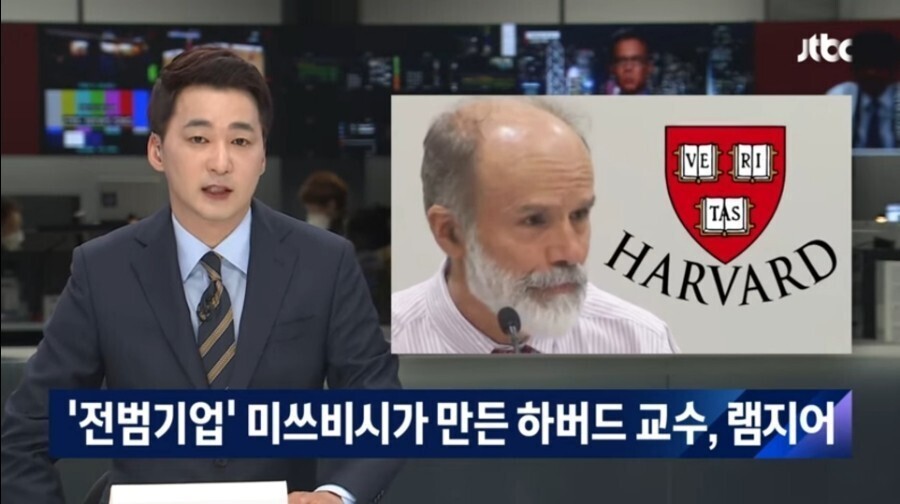hankyoreh
Links to other country sites 다른 나라 사이트 링크
[Editorial] Ramseyer's comfort women paper is an affront to human rights and scholarship

An academic paper by Harvard Law School professor J. Mark Ramseyer falsely portraying survivors of Japanese military sexual slavery as “prostitutes” is drawing ever louder international calls for its retraction. Harvard law students have organized seminars to hear the testimony of “comfort woman” survivor Lee Yong-soo, feminists around the world have shared statements of solidarity, and eminent scholars have offered point-by-point critiques of issues with the paper.
In a statement released on Feb. 17, two Harvard historians, Carter Eckert and Andrew Gordon, urged the International Review of Law and Economics to retract the paper, citing its “egregious violation of academic integrity.”
“As historians of Japan and Korea, what initially appalled us was Ramseyer’s elision of the larger political and economic contexts of colonialism and gender in which the comfort women system was conceived and implemented,” the professors wrote. They also noted that Ramseyer had not located a single actual contract related to Korean comfort women.
An open letter of solidarity issued by feminists around the world, including over 1,100 researchers and members of groups in Korea and overseas, similarly blasted Ramseyer’s argument, which they said “not only perpetuates egregious violence towards these women and the system’s contemporary implications but also colludes with and validates the Japanese state’s own intentional erasure of this violent history.”
The Harvard Law School students’ association has also protested the paper, and in a Feb. 16 seminar, human rights activist Lee Yong-soo, herself a survivor of wartime sexual slavery, angrily denounced Japan for “barging into Korea, dragging off girls and behaving lawlessly.”
“Over 70 years have passed, yet the Japanese government has not changed since then,” she said. Additionally, Korean groups in the US have been conducting an international campaign to petition for the paper’s retraction.
In a 1993 statement released by then-Chief Cabinet Secretary Yohei Kono, the Japanese government acknowledged and apologized for its military’s involvement in the forced mobilization of comfort women. In 1996, the UN special rapporteur on human rights described the comfort women system as constituting “sexual slavery” and a “war crime” perpetrated in an organized and forcible manner by the Japanese military.
Yet Japanese right-wingers continue to fabricate history as a way of covering up responsibility. To defend Ramseyer’s paper — which is based on their own arguments — as an example of “academic freedom” threatens the international consensus that such inhumane crimes should never be allowed to happen again.
It’s time for the International Review of Law and Economy to retract Ramseyer’s paper, a work that distorts history and insults the victims of sexual violence without a shred of academic evidence. We also hope that Harvard officials will take appropriate measures, rather than continuing to stay quiet in the name of “academic freedom.”
Please direct questions or comments to [english@hani.co.kr]

Editorial・opinion
![[Column] The state is back — but is it in business? [Column] The state is back — but is it in business?](https://flexible.img.hani.co.kr/flexible/normal/500/300/imgdb/original/2024/0506/8217149564092725.jpg) [Column] The state is back — but is it in business?
[Column] The state is back — but is it in business?![[Column] Life on our Trisolaris [Column] Life on our Trisolaris](https://flexible.img.hani.co.kr/flexible/normal/500/300/imgdb/original/2024/0505/4817148682278544.jpg) [Column] Life on our Trisolaris
[Column] Life on our Trisolaris- [Editorial] Penalties for airing allegations against Korea’s first lady endanger free press
- [Editorial] Yoon must halt procurement of SM-3 interceptor missiles
- [Guest essay] Maybe Korea’s rapid population decline is an opportunity, not a crisis
- [Column] Can Yoon steer diplomacy with Russia, China back on track?
- [Column] Season 2 of special prosecutor probe may be coming to Korea soon
- [Column] Park Geun-hye déjà vu in Yoon Suk-yeol
- [Editorial] New weight of N. Korea’s nuclear threats makes dialogue all the more urgent
- [Guest essay] The real reason Korea’s new right wants to dub Rhee a founding father
Most viewed articles
- 1[Column] Why Korea’s hard right is fated to lose
- 2[Column] The state is back — but is it in business?
- 360% of young Koreans see no need to have kids after marriage
- 4Amid US-China clash, Korea must remember its failures in the 19th century, advises scholar
- 5Japan says it’s not pressuring Naver to sell Line, but Korean insiders say otherwise
- 6[Reporter’s notebook] In Min’s world, she’s the artist — and NewJeans is her art
- 7AI is catching up with humans at a ‘shocking’ rate
- 8S. Korean chaebols comprise 84% of GDP but only 10% of jobs
- 9[Column] Life on our Trisolaris
- 10[Reportage] New funeral culture taking hold in South Korea